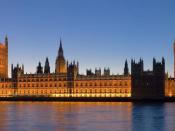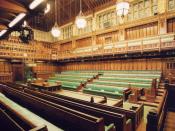Parliament consists of two houses, the House of Commons and the House of Lords. The U.K is broken down into voting constituencies and citizens living in each of them elect a member to the House of Commons. Almost all candidates in general elections belong to and stand on behalf of a party. The party that gains the majority in the House of Commons usually forms the government and the leader of that party the Prime Minister. All proposed legislation is first put to the House of Commons but must go through both Houses before it can become law. The term 'representative' is taken to mean how well Parliament represents and reflects society's composition and views.
A main criticism of Parliament is that it is not a microcosm of society, excluding certain groups, such as women and ethnic minorities. Instead, Parliament has a disproportionate amount of white, middle class, middle aged men who have attended public school and Oxbridge.
Parliament has been accused of involving an 'old boys' network and men having an unfair advantage over women. This may be due to the lack of childcare facilities and the unsociable working hours, which may deter women from entering politics. In the present Parliament, 18% of MP's are women, which certainly does not reflect society's composition, but it is argued that this is not the fault of Parliament but it's selection procedures, with fewer women putting themselves forward. In addition, it can be seen to represent a social bias against female candidates. In recent elections there have been cases where the labour party in particular have lost some of their so-called "safe-seats" to the opposition by putting female candidates to run against the male candidates of other parties. Hence the introduction of the all women short-lists (mandatory all female candidates in...


